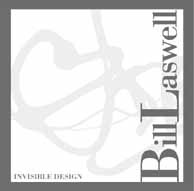BILL LASWELL


1/ Black Aether (Laswell) 4.19
2/ Commander Guevara (Laswell) 7.02
3/ Oceans of Borrowed Money (Laswell) 5.10
4/ Aisha (Laswell) 5.41
5/ Night Air & Low Frequency (Laswell) 9.15
6/ White Arc Special (Laswell) 5.38
7/ Aghora (Laswell) 9.47
Recorded at Orange Music, Orange, New Jersey
Engineered by Robert Musso
Produced by Bill Laswell
Material Inc.: John Brown
Axiom: Bill Murphy
Meta: Janet Rienstra
Executive Producer: John Zorn
Associate Producer: Kazunori Sugiyama
Mastered by Allan Tucker at Foothill Digital, NYC
Bill Laswell: basses, noises, beats, soundscapes.
1999 - Tzadik (USA), TZ 7044 (CD)
Hans Stoeve (courtesy of the Nadabrahma website)
Bill Laswell is the Trickster God of the New York City experimental music scene, working his strange enchantment from the shadows, disguising himself in the masquerade of his myriad projects and labels; he cuts a figure of inscrutable motives, sometimes wrecking dreadful havoc, often consecrating the most joyful unions. Laswell's disparate train of revelers includes refugees from the original Parliament/ Funkadelic collective, the Last Poets, the inimitable Buckethead, the ghost of Old Bull Lee himself, William S. Burroughs, moonlighters from the John Zorn NYC free jazz scene, and a considerable amount of world and electronic music heavyweights. No two Laswell projects sound alike, and while many truly soar, even the ones that suck are at least stunningly unique failures.
Even if Laswell had retired in 1994 after releasing Axiom Ambient: Lost in the Translation, he could have rested fat on the laurels of having created one of the sex music masterpieces of the electronic age. But Laswell has persisted. And Invisible Design is clearly his most inspired composition since Axiom Ambient; even 1998's formidable Panthalassa pales beside the audacious genius of Invisible Design.
This album is Laswell's apocalypse. Gone are the train of revelers, gone are the occult ceremonials. This is the apotheosis of Bill Laswell, his ascent from a trickster god of shadowy ambivalence to a Creator of dazzling compositional authority. First off, Laswell has restored his bass guitar to primacy, a break from much of his dub and electronic output where his bass lines are layed down sparsely, then clipped, looped and treated. The opening track, "Black Aether," is a nightmarish masterpiece of dark ambient, punctuating long, slithering solo bass explorations with blasts of industrial crunch. The twilit "Commander Guevara" highlights the subtle lyricism of Laswell's meandering bass, accompanied only by faded washes of windchimes. The Eastern- tinged "Aisha" is one of the album's highlights: played by bass, tamboura, and gentle percusion, the track displays a tight, almost folk- like compositional structure that is rare in jazz and experimental music. "Night Air and Low Frequency" is reminiscent of the world- ambient bliss of Axiom Ambient and showcases the bass/ tabla lock that created the compelling rhythms of that album.
Invisible Design is a simply brilliant, though emotionally complex album, full of desolation and emptiness. Seldom does the Tzadik label produce works of real sustained psychological impact, opting generally for the wedding of musical brilliance and emotional sterility. There is something truly candid and open about Invisible Design that's a real gift from Bill Laswell, an artist who seems to celebrate obfuscation and mystery. Considering that Laswell records almost entirely under various band and project names, the fact that he's released Invisible Design under his own name is a testament to the honesty of the work. Laswell's opus stands as one of the most forthright and personal albums of instrumental music released this year. It possesses the gravity of a revelation.
9.5/10...Spectacular
Brent S. Sirota (courtesy of the Pitchfork Media website)